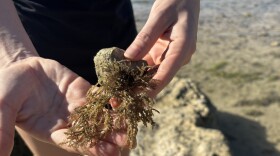The state Department of Agriculture has extended an interim rule to slow the spread of the coconut rhinoceros beetles across Hawaiʻi.
The department’s Advisory Committee on Plants and Animals just approved a rule to stop the movement of all potential CRB breeding material from Oʻahu to other islands. That includes palm plants and decomposing plant material like mulch or compost.
The DOA is calling this an "emergency situation" because the CRB poses a severe and imminent threat to Hawaiʻi’s native ecosystems, agriculture and tourism industries.
"If CRB continues to spread unchecked, it could lead to significant damage to palm species and other plants essential to Hawaiʻi’s landscape and economy,” the agency's Plant Quarantine Branch said in its proposed interim rule.
On Friday, DOA Chair Sharon Hurd signed the interim rule, which could be in effect for up to a year.
The agency considers Oʻahu to be "infested" with the invasive beetle, so the rule is mostly meant to help slow the spread of the pest on neighbor islands.
CRB detections were reported on Maui, Hawaiʻi Island and Kauaʻi last year. The DOA has already imposed and renewed similar interim rules for several years. It first issued a one-year rule in 2022 and extended it in 2023.
Conservation advocates support the rule but are using it to urge the department to do more — something they’ve been doing for months with other plans and interim rules for invasive species.
“We need these rules to be more permanent. This pest is not going away anytime soon, and we're seeing it spread across the state. Kauaʻi is turning into a similar situation as Oʻahu,” said Chelsea Arnott, with the state Department of Land and Natural Resources.
“We're really looking at making more permanent rules that can quarantine and prevent the movement of these materials and other materials that not only harbor CRB, but other pests," she added.
The department has been repeatedly asked to move along a set of permanent invasive species rules that were approved in January 2023, some of which include quarantines of infested material.
A public hearing on the rules was held earlier this year, but no progress has been made since.
Jonathan Ho, acting manager of the Plant Quarantine Branch, said he’s finalizing those permanent rules and that the state Board of Agriculture should be voting on their final approval during this month’s meeting.
“The department understands that the continued movement of CRB is going to be a problem and allowing the restrictions that are in place to go away is clearly not going to solve the problem,” he said.
Ho said the department can then start to educate local businesses about the new rules.
The DOA has been sensitive about hurting agriculture-related businesses by implementing aggressive invasive species rules.
Operations like nurseries could be affected by the rules because invasive species are often spread through the transportation of infected plant material.






